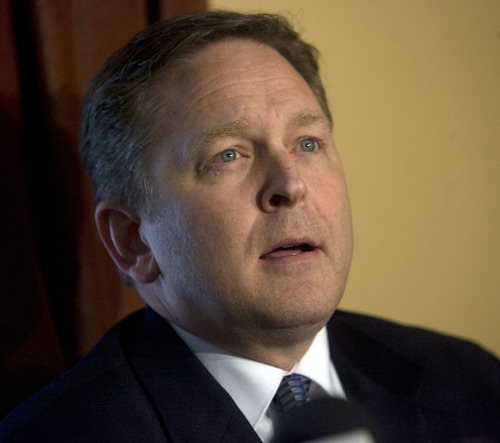This is an archived article that was published on sltrib.com in 2011, and information in the article may be outdated. It is provided only for personal research purposes and may not be reprinted.
Former Rep. Craig Frank is weighing carefully a bid to knock off Republican Gov. Gary Herbert next year, meeting with fundraisers, campaign strategists and party activists.
"If you look at what Gary Herbert has done in office so far, there would be quite a few similarities between us," Frank said in an interview Friday. "But I think if you look at my voting record and see where I've been over the years, I think you'd find we have decidedly different goals and aspirations for the great state of Utah."
Frank, who could become the first Republican to mount a challenge to Herbert, said he would have vetoed immigration and open-records bills passed last year — measures Herbert has been excoriated for signing. And Frank leaves the door open for a revival of school vouchers.
"HB116 [theguest-worker bill] and HB477 [the records bill] wounded the governor politically," said David Kirkham, an organizer of Utah's tea party movement. "I think he's weak and vulnerable."
Kirkham's group has been interviewing potential challengers since the legislative session ended in March.
"We are actively pursuing a candidate to run against Herbert. That's no secret," he said. "Who that will be, I don't know."
For his part, the governor said he is focusing on his job while acknowledging that difficult decisions can be divisive.
"Anytime you take a tough stance on difficult issues, there are going to be those who oppose and object," Herbert said in a statement. "That's just the nature of our political system."
Quin Monson, associate director of Brigham Young University's Center for the Study of Elections and Democracy, said Herbert would still be the favorite to hang on to the governorship.
"I would always bet on an incumbent unless there was some kind of scandal or something that was deeply controversial to his base," Monson said. "Herbert may be a little bruised, but I don't see him as in any kind of deep trouble."
Utah State University political scientist Michael Lyons agrees that the governor is in a strong position.
"He may not be the most charismatic campaigner in the world, but incumbents are hard to defeat and the state economy is strengthening," Lyons said. "I just don't see where voters would find any compelling reason to displace him."
Frank, who represented Pleasant Grove and Cedar Hills in the Utah Legislature for nearly eight years before being forced to giveup his seat earlier this year when it was discovered he didn't live within the legislative boundaries, said he has spoken with donors and activists, but "I haven't started collecting money."
His legislative campaign account is tapped out, "which becomes a problem if you run against a guy who has a million bucks in his account."
In coming months, Frank said he plans to begin lining up donors and polling to determine whether a challenge would be viable.
"Every legislator up on the Hill likes to think everybody throughout the entire state knows who they are," he said. "We get a big head sometimes up there, so it's really about getting real good numbers and it's clearly about picking up the grass-roots support in certain areas."
Those "certain areas" include the various conservative factions like the tea party, the 9/12 Project and others, but also any other organizations of GOP delegates.
Frank said he differs from Herbert because he is a "privatization guy" and ran several bills that sought to move government functions to the private sector.
Frank noted he has never been endorsed by the Utah Education Association, a nod Herbert sought and received — along with his Democratic rival, Peter Corroon — when he ran for governor in 2010.
"I've been very pro-education in my approach," Frank said, "but at the same time I'm a huge advocate for educational choice and options for Utah families and their children, a lot more so than Governor Herbert."
Frank said that includes any proposal to give families more choices, "whether it's tuition tax credits, vouchers, concurrent enrollment."
Frank had begun work on his own revisions to the state open records law, but he said he would have made sure the content and process were very different.
William Skokos, CEO of American Resource Petroleum Corp., an oil shale and tar sands development company, said a groundswell of people has been asking him to run for governor.
"I am giving it some consideration," he said, explaining he might make a decision in the fall. "I have nothing personal against Governor Herbert. He's a very nice man — I was with him just the other day. We might have some differences in philosophy and the way we might do things."
Sen. John Valentine, R-Orem, has a major fundraiser scheduled for Saturday and said he is leaving his options open until he sees how legislative and congressional boundaries are redrawn, adding he could run for a congressional seat.
Rep. Stephen Sandstrom, R-Orem, said he has also had "a bunch of people" urging him to run for governor and he hoped to make up his mind while he was climbing Mount Everest, but the climb got cut short when he suffered heart problems.
"I have a solid group of people and delegates who want me to run," he said. "The idea kind of intrigues me, but I'll keep my options open, for even a federal-type office."
Former state Rep. Morgan Philpot, who challenged U.S. Rep. Jim Matheson in 2010, said he's not making any decisions until he sees the redrawn boundaries.



